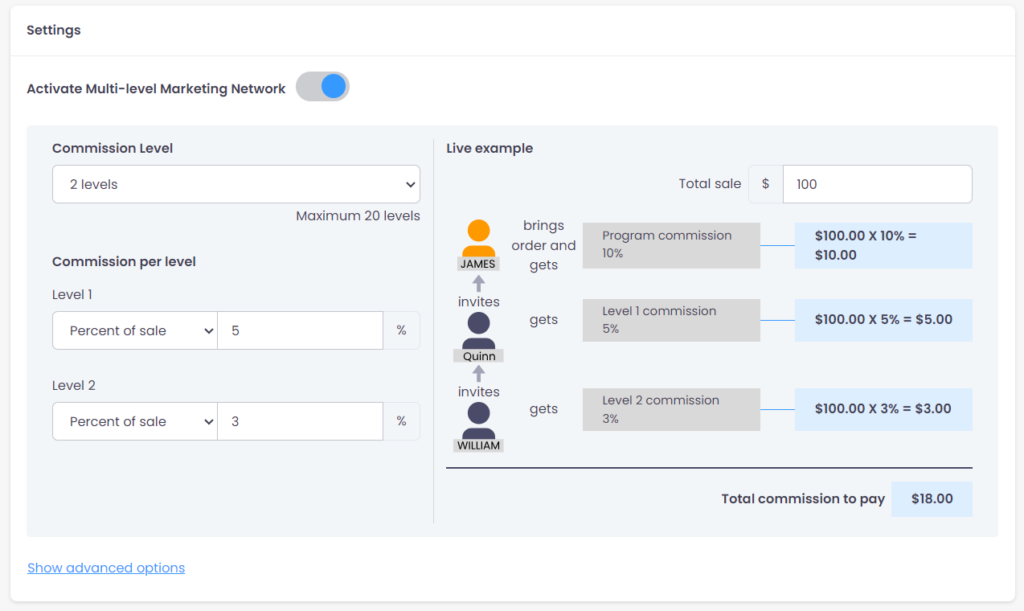Affiliate marketing and MLM (Multi-Level Marketing) are two common business models, and they are totally different from each other. And they are usually mistaken for each other (actually it is one of the common mistakes for one who exploring MMO method)
Let’s explore Affiliate Marketing and MLM to discern their differences and determine which one is optimal!
What is Affiliate Marketing?
I can tell that most people here have not yet form a clear understanding of affiliate marketing.
Affiliate marketing is a model where individuals promote products for brands and earn commissions on successful referrals. Such individuals are called affiliates (or affiliate marketer). This model benefits both the marketer and the brands, as the marketer receives cash when referrals are made.
Here is 4 steps on how it works:
- Affiliate join a program: Affiliate sign up for an affiliate network or brand.
- Affiliate get the links: Receive a unique tracking link.
- Promote: Affiliates Share the link via content, social media, or ads.
- Affiliates earn commissions: They Get paid for sales or leads through your link.

In today’s digital era, affiliate marketing is a potent business strategy for driving sales particularly see retailer sectors like fashion, outdoors, and health. With over 80% of online businesses deploying an affiliate program, the industry is currently valued at $8.2 billion, which contributes to 15% of e-commerce revenue.
See more: Is affiliate marketing oversaturated in 2024?
About Multi-level Marketing
People often mistakenly consider affiliate marketing and multi-level marketing (MLM) as interchangeable terms, assuming they are similar.
While MLM and Affiliate Marketing both provide a pathway for individuals to achieve a decent residual income, they are distinct. This part will shed light on disparities between these two approaches, and some common misunderstandings on MLM.
What is Multi-level Marketing?
Multi-level marketing (MLM), also known as Network Marketing, relies on a unique structured sales team, and income for a salesman is associated with recruiting and building his network of distributors.
The structure of the sales team and the potential income are the main features that distinguish opportunities distinguish MLM from affiliate marketing.
How does it work
- Product acquisition: During the startup phase, recruits are expected to sign a contract and pay an initial fee. This fee allows them to acquire the company’s products, which they can sell to end-users.
- Downline network: MLM relies on a network of distributors who recruit others into the program. When a new member joins, they become part of their recruiter’s “downline.”
- Revenue generation: A member (and also a recruiter) earns a portion of the money made from the sales of their downline members.
And MLM is LEGAL (even when it is typically associated with bad rumors).

Multi-level Marketing is not a Pyramid scheme
The term “pyramid schemes” is sometimes inaccurately associated with MLM. As both are presented in a pyramid shape, MLM sounds and seems like an illegal Pyramid Scheme.
But it’s not.
MLM involves selling products and earning commissions on personal sales and team member’s sales. The main source of profit is products.
It is different from the Pyramid Scheme, where profit mainly comes from the recruit’s initial investments. MLM, by its essence, depends heavily on the affiliates’ performance. In this manner, the recruitment phase is just a side-option of the affiliate – by which they help the business owner upscale market appearance in exchange for bonus commission.
When does Multi-level Marketing turn into a Pyramid Scheme?
So, such claims referring to MLM as a scam are pointing their finger at the Pyramid Schemes. However, as they have close relationships and many similarities, it is easy for MLM to transform into the Pyramid Scheme. Explore how are Affiliate Marketing vs Pyramid Schemes different.
An MLM business model is regularly turning into a Pyramid Scheme if they have the following tendency:
- Affiliates are required a high initial investment to join (such as buying products or an entry fee).
- Affiliates can have commission MLM (instead of after reaching a certain commission threshold)
- Affiliates are allowed to sell only a prefixed list of items (instead of all products available in the program).
- Only a minor part (or even zero percentage) of affiliates’ income comes from selling products.
- The products are overpriced.
- A very low number of end users (who buy the product but do not participate in the scheme).
Please note that a credible MLM program can still have 01 or 02 points of the list above. However, stay cautious anyway, and do thorough research when you are about to join one. It is a profitable game when you play as an experienced marketer.
Key differences between Affiliate Marketing and Multi-level Marketing
In short, the key difference lies in the business structure and revenue generation methods: affiliate marketing promotes products for commissions, while MLM involves recruiting a sales team and earning from both personal and team-generated sales.
| Differences | Affiliate Marketing | Multi-Level Marketing (MLM) |
| Business Model | Commission comes from product/service promotion. | Emphasizes recruitment. Earning from products/services promotion of affiliates’ sales and recruits’ sales. |
| Structure | Individual affiliates working directly with brands. | Involves a hierarchical structure with recruits and recruiters. |
| Income Source | Earns commissions from personal sales and leads. | Generates income from personal sales and recruits’ sales at different levels. |
| Commission Structure | Typically a fixed commission or a percentage of sales. | Complex structure involving bonuses, and incentives tied to recruitment. |
Affiliate Marketing and Multi-level Marketing: Which one to choose?
Can not say exactly which one is better, Affiliate Marketing or Network marketing, as both can bring significant benefits for participants.
Affiliate Marketing is more affordable to start than MLM, as there is generally no necessity to buy a starter pack or stock of items. Individual affiliates likewise have the adaptability to advance their promotions, allowing them to specify in their domain of specialty that drives sales.
Notwithstanding, MLM can offer some benefits over affiliate advertising, for example, the possibility to earn a commission from various sources. This can turn out a huge revenue stream. Furthermore, MLM provides incorporative preparations and support from the whole network, which can be valuable in many cases.
But, to be straightforward, we only suggest MLM if you already have experience in marketing.
Do not rely on the brand reputation.
Why?
It is tough to tell which one is MML or a pyramid scheme depending on reputation only. Pyramid Scheme, in its essence, can upscale exponentially just by recruitment. If the organization is big, probably they did extremely well at reputation polishment. You are probably among a bunch of people who non-stop praise “how good their products are”, and “how much money you can get if join with us”.
It is really easy to see such tricks from an outsider’s point of view. But, just imagine you get surrounded by such flying words, how much chance can you realize it?
Eventually, the decision will rely upon the individual’s objectives, experience, and individual inclinations. It could merit thinking about the two choices and gauging the upsides and downsides before pursuing a choice.
Multi-tier Affiliate Marketing: The Integration of Affiliate Marketing and MLM
An Affiliate Program that has MLM qualities? It sounds magical, but not impossible.
The specificity of MLM brings huge potential in empowering affiliates to search out individual advertisers effectively. However, the feature that makes them easily transformed into the Pyramid scheme is the initial fee.
The Multi-tier Affiliate Marketing model eliminates the limitations of MLM, because:
- This model is online based – meaning there is no need to use physical products to promote. Marketing materials (images, advertising banners) are free. There is no reason for affiliates to be charged for entering such a program.
- It pays admission based on performance. That means members are forced to create real results.
So, Multi-tier Affiliate Marketing has great potential because it helps business managers promote their partner community without bringing risks to affiliates.
A Multi-tier Affiliate Marketing Program needs the right balance, where recruitment fills in as a support element as opposed to the focal point of your business model. So, what characteristics a good Multi-tier Affiliate Marketing Program should have?
A Multi-tier Commission Framework
A multi-layered commission framework allows affiliates to receive part of the sales produced by the newcomers they get. It should be prefixed and clear. This approach encourages group development while focusing on driving sales instead of simply extending the organization.

Focus on Sales
Quantity over Quality. The reward structure (including commission and bonus) needs to prioritize the individuals who convert into substantial deals, instead of one having a high number of newbies acquired. For example, a performance-based bonus commission allows affiliates to get bonuses when their low-tier well performs.
Transparency
A good program requires a clear, universal framework to manage sales and participants’ practices. Straightforwardness constructs entrust with affiliates, empowering fair rewards in light of exact sales information and a focus on genuine implementation.
Moral Growth
The program should support a moral viewpoint by explaining that it rotates around sales. All affiliates, no matter what their level, can accomplish accomplishments through sales without mandatory recruitment.
With the most worthwhile quality of MLM in affiliate campaigns, both business owners and affiliates are beneficial. As the model will cultivate a moral, economical, and sales-driven development model, it will bring a good reputation for brands, and intimidate risks for affiliates.
Conclusion
All in all, both Multi-level Marketing and Affiliate Marketing can be compelling ways of acquiring pay. While Affiliate Marketing offers the flexibility to promote a large number of items and the possibility to earn a higher commission on deals, MLM can foster a community and diversify the income source of affiliates.
Lastly, the combination between MLM and Affiliate Marketing can be a good choice to think of. It combines the good sides of both business models and, as long as two sides cooperate with good faith, it is extreme potential.